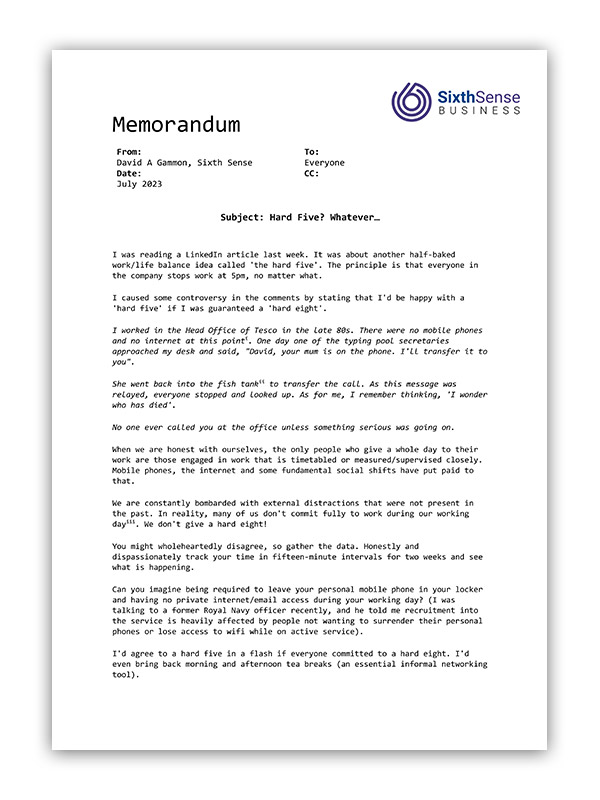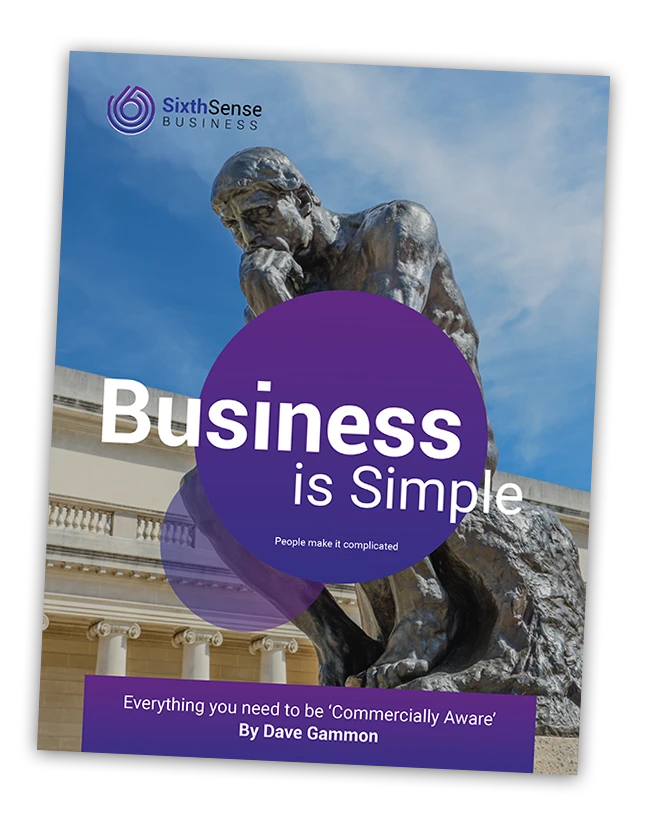David A Gammon, Sixth Sense
To:
Everyone
July, 2023
I was reading a LinkedIn article last week. It was about another half-baked work/life balance idea called ‘the hard five’. The principle is that everyone in the company stops work at 5pm, no matter what.
I caused some controversy in the comments by stating that I’d be happy with a ‘hard five’ if I was guaranteed a ‘hard eight’.
I worked in the Head Office of Tesco in the late 80s. There were no mobile phones and no internet at this point . One day one of the typing pool secretaries approached my desk and said, “David, your mum is on the phone. I’ll transfer it to you”.
She went back into the fish tank to transfer the call. As this message was relayed, everyone stopped and looked up. As for me, I remember thinking, ‘I wonder who has died’.
No one ever called you at the office unless something serious was going on.
When we are honest with ourselves, the only people who give a whole day to their work are those engaged in work that is timetabled or measured/supervised closely. Mobile phones, the internet and some fundamental social shifts have put paid to that.
We are constantly bombarded with external distractions that were not present in the past. In reality, many of us don’t commit fully to work during our working day . We don’t give a hard eight!
You might wholeheartedly disagree, so gather the data. Honestly and dispassionately track your time in fifteen-minute intervals for two weeks and see what is happening.
Can you imagine being required to leave your personal mobile phone in your locker and having no private internet/email access during your working day? (I was talking to a former Royal Navy officer recently, and he told me recruitment into the service is heavily affected by people not wanting to surrender their personal phones or lose access to wifi while on active service).
I’d agree to a hard five in a flash if everyone committed to a hard eight. I’d even bring back morning and afternoon tea breaks (an essential informal networking tool).
But the reality is that we live in a distraction-filled world, and this eats into our productivity in two ways:
- External distractions stop us from engaging in work activities (Whatsapp, texts, phone calls, emails and social media) by demanding we respond to personal issues.
- Procrastination where we make conscious choices to do work that we prefer to do rather than what is the most critical and practical activity at that moment.
Provided we are willing to work without external distraction, make good priority decisions and eliminate procrastination, no one should need to work more than a hard eight, but they do need to work in the hard eight.
This 40-hour working week still leaves you more than 75% of your week for other stuff, even before you factor in leave and public holidays.
As commercial leaders, we must bring balance to the work/life balance debate.
We have to make a case for the importance of work not just for commercial gain but as a place for individuals to experience personal growth, express themselves and develop self-mastery.
Work is where we can build broader connections with others, contribute to something bigger than our self-interest and develop mastery of something. All these things are essential in a balanced life, and I instil this in every leader I coach and train.

